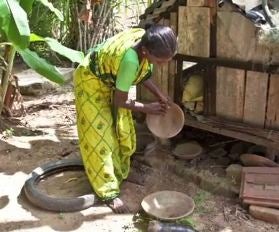 On Jan. 7 from 2-4 p.m., there will be a live chat on Sri Lanka's aging population at facebook.com/worldbanksrilanka. Tehani Ariyaratne, from the Centre for Poverty Analysis, will be joining the chat. Here, she discusses her recent work on the subject.
On Jan. 7 from 2-4 p.m., there will be a live chat on Sri Lanka's aging population at facebook.com/worldbanksrilanka. Tehani Ariyaratne, from the Centre for Poverty Analysis, will be joining the chat. Here, she discusses her recent work on the subject.
The Centre for Poverty Analysis recently put the finishing touches on a photo documentary portraying an oft-forgotten side in the discussion on demographic transitions and the elderly: productivity.
In Sri Lanka, an individual above the age of 60 is considered 'elderly'. Our documentary focussed on individuals in two districts, Hambantota and Batticaloa, and captures a diverse, rural elderly population. During the course of our fieldwork, we met and spoke with many individuals about their ideas regarding the benefits of and constraints to maintaining an active lifestyle.
Most of them remain active and productive for many reasons; some enjoy the work they do, some need to work to maintain an income, some have dependents like children and grandchildren, some have medical expenses they need to cover, and some work simply because they are used to a particular lifestyle and routine. Apart from economic activities, there were those who engaged in recreational and community work, such as being involved in the local temple or kovil, helping out at shramadhanas, or participating in the local elders’ societies and other collectives.
Physical and economic activity is not the only way in which the elderly contibute. There is also a wealth of knowledge and skills the elderly have, which can be transferred to younger generations. Many of our respondents from the field spoke of participating in community activities by providing advice and guidance, and helping their grandchildren with schoolwork, or mentoring youth entering their trade. These are valuable assets that need recognition, and can be harnessed by society, to learn from the experiences of these individuals.
Many of the elderly acknowledged the undeniable physical, emotional and mental health benefits they gained from remaining active, interacting with people, and engaging with the community. Though it is inevitable that the body slows down with age and wear and tear, staying active was a great boost to all aspects of their health. However, staying productive was not always a choice.
Most of the individuals we met in rural areas had little savings, pensions, or other forms of monetary assistance; many had none at all. Due to this lack of income, they were compelled to engage in economic activities. Some use their income to run their household; those who live with their children or other family members contributed their earnings to the household income; while still others helped the family cut costs by assisting with childcare and household chores. While these circumstances and lack of choice leave much to be desired, the additional income the elders obtain is always a benefit.
When talking about productivity, it is important to identify the many constraints and challenges elderly citizens face in their lives: declining health and increasing health-related costs, the need for adequate leisure and recreation time, and most importantly, the need for them to have options in the type of work they do and the ways in which they remain active. How can we, as a society, help address these concerns and constraints?
As a heterogeneous group, the elderly population faces many challenges, but they are an important part of a country’s citizenry. Their skills, knowledge and experiences need to be documented and used, and they need to be given the spaces and support systems to continue being productive in ways that are beneficial to them.
Here are some questions to consider:
- How can we recognize their contribution to society?
- What changes are needed to ensure their health and well-being?
- How can we improve conditions so they remain active?
- Are we doing enough to ensure their rights?


Join the Conversation